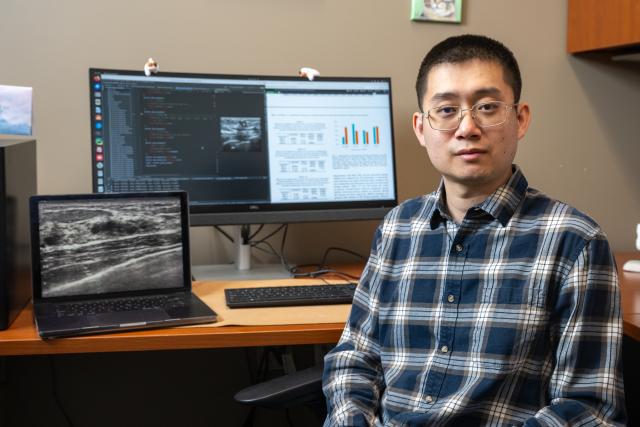Kean Researcher Kuan Huang, Ph.D., Working to Transform Lives with AI Cancer Screening

Kean Assistant Professor Kuan Huang, Ph.D., is researching the use of artificial intelligence (AI) in breast cancer screening, aiming to develop highly accurate diagnostic tools that can ultimately save lives.
A faculty member in the Department of Computer Science and Technology at Kean’s Dorothy and George Hennings College of Science, Mathematics and Technology (HCSMT), Huang began his research as a graduate student at Utah State University in 2016. He continued his work during a postdoctoral fellowship at Baylor College of Medicine before bringing it to Kean in 2022.
“We want to develop an AI-based system that can be implemented in hospitals to assist in breast cancer diagnosis and treatment,” Huang said. “Our ultimate goal is to develop highly accurate AI that could eventually transform lives.”
His research utilizes real-patient ultrasound data from publicly available datasets and his team is currently analyzing approximately 2,000 images. The team, which includes six Kean student researchers, employs deep learning techniques, which use computer and math algorithms to help computers learn from real world examples.
“It mimics how humans learn through practice. As a core part of AI, it enables computers to learn and make predictions automatically,” he said.
Huang received a $203,000 NSF research grant for the work. His goal is to integrate AI tools into a comprehensive framework that could be used to guide doctors and radiologists in diagnosing breast cancer.
“This work seeks to create a robust, accessible and publicly available AI framework that supports radiologists in identifying and classifying breast lesions more effectively,” Huang said, adding that AI may detect details not visible to the human eye. “However, AI-assisted diagnostic tools cannot work alone. Radiologists are still essential, with AI as a helpful assistant.”
Patricia Morreale, Ph.D., professor and chair of the Department of Computer Science and Technology at HCSMT, said Huang is a talented researcher and his work is “highly relevant for both the national research agenda and artificial intelligence and healthcare technology.”
At Kean, he teaches undergraduates and graduates, supervises student research and collaborates with other faculty to provide Kean students with research opportunities. He has published more than 20 scientific papers on breast cancer detection and has appeared at international conferences.
"The results of Dr. Kuan Huang's work are highly impactful, both in the healthcare arena, as breast cancer tumors continue to have a high mortality rate, and in AI research, where his work in computer vision can be applied to similar problems,” Morreale said. “Working with Dr. Huang, students get exposure to the most advanced techniques for machine learning and have the experience of applying these methods to an important problem, cancer detection.”
HCSMT Dean George Chang, Ph.D., said Huang’s research represents a significant advancement in the fight against breast cancer.
“His work has the potential to greatly enhance the accuracy and efficiency of early detection, ultimately leading to better outcomes for patients,” Chang said. “The integration of AI into this vital screening process could reduce false positives and missed diagnoses, which are crucial for ensuring timely and appropriate treatment, while also empowering health professionals to better utilize AI technology in their practice.”
Kean senior Cesar Marte Jimenez, of Elizabeth, is a Kean senior majoring in IT. He will be pursuing a master’s degree at Kean in the fall, and Kuan said he plans to support Jimenez as his graduate student assistant.
As one of the student researchers on the project, Jimenez is testing a deep learning model for segmenting breast ultrasound images to improve performance and accuracy.
“Participating in this research connects classroom theory to real-world challenges, sharpens my technical and critical thinking skills, and provides valuable opportunities to work with experienced faculty,” Jimenez said. “My career goal is to carry over the skills I am learning now to broaden my expertise and help me advance into more specialized roles in the future.”